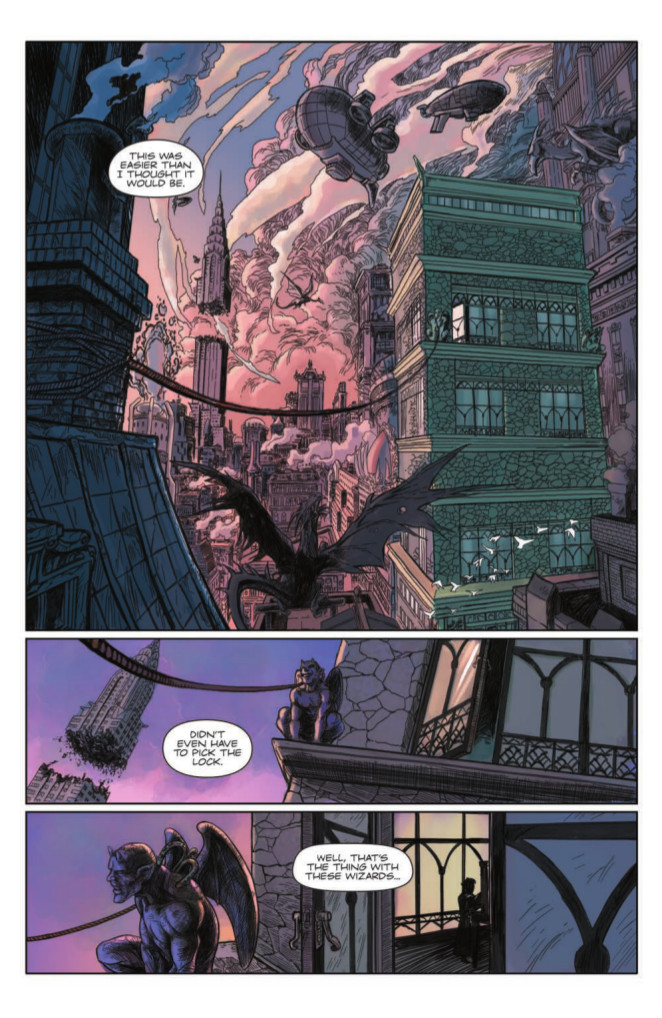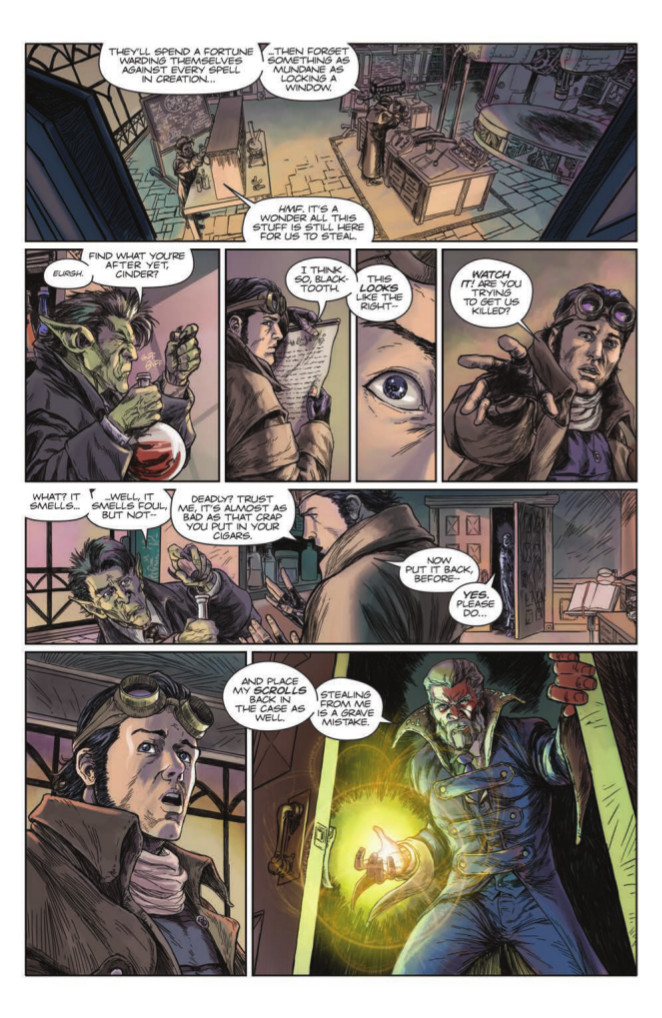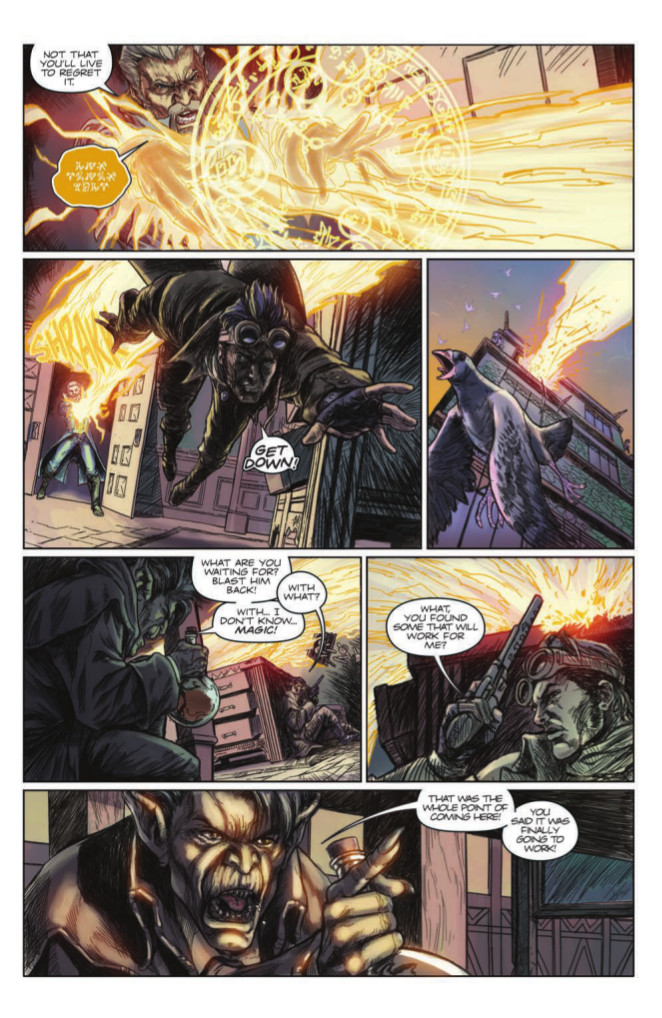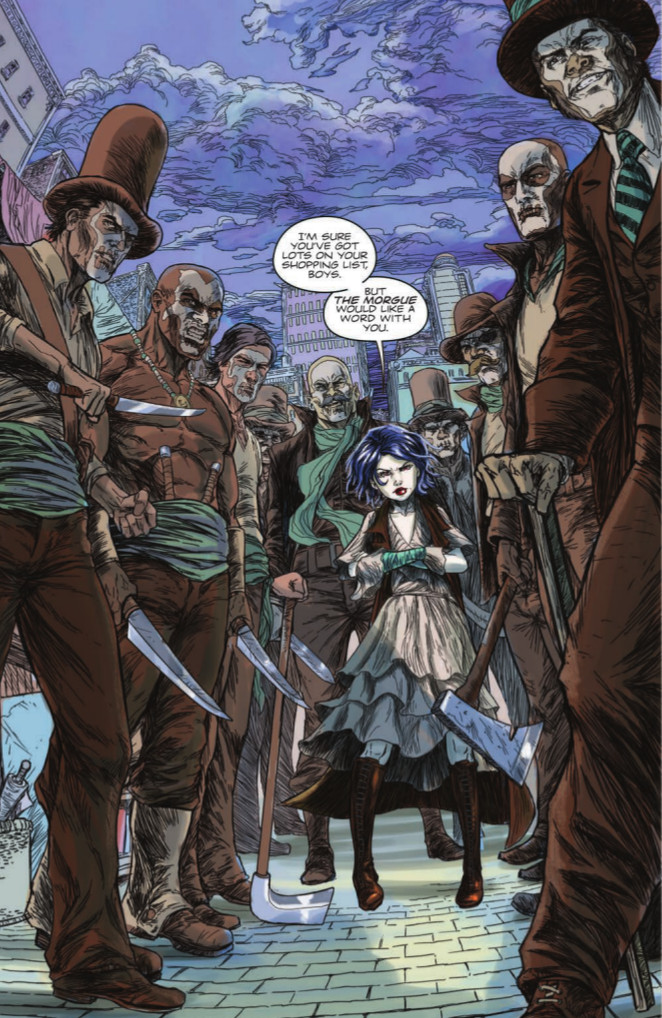Rich Douek and the Unpowered Prince: Talking Gutter Magic with its Writer and Creator
For an industry where pay and hours are often lamented, there are seemingly a laundry list of people who are wondering “how to break in” to comics. And then past that, the question is: “how do I get people to read my comic?” Those are questions that are asked inside and outside of the industry, and there’s no real easy answer for either of them. Quite often, the best answer is something like, “just make comics.” If you keep making them, there’s a chance you’ll get discovered and get an audience and maybe even get another job in comics.
That’s what Rich Douek’s doing – making comics. And a couple weeks back, he released the first issue of the book he developed at IDW/Comics Experience with artist Brett Barkley, colorist Jules Rivera, and letterer Nic Shaw, Gutter Magic. It’s an idea he’s been working on for a while now, but it came to life in comics in a big way with a strong first issue, and I talked with Douek about the book today. Not just that, though, as we discuss the project’s development, the team he worked with, Comics Experience’s value, the hustle required to get the book out to a bigger audience, and much more. It’s the first of two Gutter Magic centric interviews today, as we’re also running an interview with Barkley here in a bit. If you get the chance, check out this magic centric book, as its available at comic shops and digital vendors now.
So let’s start at the beginning. Of all the writing in all the mediums in all the world, what made you want to write comics? And is it your goal to eventually – hopefully – write comics as your primary job?
RD: I’ve loved comics since I was a kid. I used to be in my neighborhood candy store every weekend spending my allowance on as many as I could get. Then, when I got older, I started hanging out at the comic store in my neighborhood, and while I’ve since moved from that neighborhood, I always found the nearest store wherever I wound up living. I’ve wanted to be a writer for as long as I can remember – probably back to when I first realized that these stories I loved were being created by people, and not just coming out of thin air. And I think that, above all, is my goal, to be a professional storyteller, more than being married to telling those stories in a specific medium. That being said, though, I would really love to be able to write comics full time, and it’s a goal I hope to make progress towards as I publish more titles.

Gutter Magic’s something you’ve been working on for years. It’s been a long gestating labor of love. What different forms did the title take as you developed it, and what made it a story you couldn’t help but tell?
RD: When I started working on Gutter Magic, my intent was to write a prose novel – but I had been running into something I think a lot of beginning writers do, in that I was obsessing so much with self-editing, I never got anything finished. I’d write a chapter, and fiddle, and fiddle, until I lost all my passion to work on it. But, the world I was creating, and picturing in my head, was something I really wanted to see rendered – and I thought about how much I loved comics, and the idea just clicked. But, I had no idea how to approach writing a comic script, which is why finding Comics Experience was such a revelation. By the time I was finished scripting the first short story, I knew I had made the right choice.
As to why I couldn’t help but tell it, the truth is that it’s a very personal story for me. I mean, I’m not running around fighting dragons and wizards, but Cinder’s struggle – the struggle of feeling inadequate, and locked out of doing the one thing you really want to be doing is something that I was going through every single day of my life – in regards to, you guessed it, writing. The desire to write was consuming me, yet at the same time I had this overwhelming feeling that I just couldn’t do it – that no matter how hard I tried, I’d never be successful at. In a weird way, writing about that struggle in the form of this story really helped me get over that feeling that was holding me back.
So you worked with Comics Experience before Gutter Magic even became a real, real thing. Or, to phrase it better, they helped you make it a real thing. Was that relationship why the book ended up at IDW?
RD: Yes, pretty much! At Comics Experience there’s an intro to comics writing course, where the final project is a complete 5-page script. My script was a five-page Gutter Magic story, featuring Cinder and a lot of the other characters in the book. And then, as I was developing the scripts for the series, I was getting critiques on them from both peers, and professionals, like Chuck Dixon, on the CE workshop.
When I started working on Gutter Magic, Comics Experience didn’t have a publishing program in place – but Andy Schmidt wanted to find a platform to showcase some of the great work coming out of the program – I think that the work I did with Brett on the initial issue really impressed him, and we were lucky enough to be chosen as one of the flagship titles for the publishing program. So yes, Gutter Magic being published at IDW is a direct result of me developing it with Comics Experience, and I give huge credit to both companies for working with us.

Here’s the easiest question you’ll have: for those that don’t know, what’s the ten thousand foot view of Gutter Magic? What’s it all about?
RD: Gutter Magic takes place in a version of modern NYC that exists in the aftermath of a WWII that was fought with magic, alongside conventional weapons – it’s about this fantastic world that has risen up in the shadow of that war. It’s about a young man named Cinder Byrnes, who comes from a family of famous and powerful wizards – except him. For whatever reason, he can’t cast a spell to save his life. So, he’s dedicated his life to figuring that out and trying to fix it. With his partner in crime, the goblin Blacktooth, he’s lied, cheated and stolen from nearly every wizard in the city, to assemble a spell that can cure his connection to magic – now, all he needs to do is figure out how to cast it before the wizards he stole from have him killed.
One thing that I’m not certain about is the nature of Gutter Magic. It’s a mini-series, I know that, but is it something that you hope to tell more of going forward, either in comics or some other form? I could easily see it becoming a Hellboy/B.P.R.D. esque series of minis.
RD: My hope is that it will go forward in some form, yes. I constructed the mini-series to have a definite end – if nothing else ever gets made, I think it has a satisfying ending to the story we are telling – however, there are so many other stories I want to tell with these characters, and in this world, that I could really see it being a series of minis, like you said, or even something more. I think a lot will depend on how the book is received by fans and the industry – if there’s a hunger out there for more, I’m happy to supply it!
Not to downplay your own contributions, but your art team is phenomenal. Jules Rivera and Nic Shaw do superb work coloring and lettering the book, respectively, but Brett Barkley…my word is that guy a find. How did the team get together, and what made each of them such a great fit for the book?
RD: The team is definitely phenomenal, and the book would not be the same without any of them.
As you said, Brett is a real find. Back when all I had was a script, an artist friend of mine named Dafu Yu recommended I check Brett’s work out – on his portfolio were these pages for a comics contest run by Stan Lee a few years ago – sample pages – and I just looked at the level of craft and storytelling and thought “this is the guy.” I got in touch with him over email and we did 5 pages, to see how it would go, and we clicked really well. From there, we just kept pushing ahead, and I can’t tell you how much he, and everyone, poured into this book to make it great.
Brett and I had been making progress on the pages, and when the IDW deal was being set up, we started looking for a colorist and letterer. Jules was also recommended to me by a friend, Tyler James, of Comixtribe. She was doing a stellar job on their Oxymoron book, and looking at her samples I gave her a test page that she knocked out of the park. Brett’s art is fantastically detailed, and I really give Jules credit for finding a style that highlights all the right things, and really brings the linework to life. She worked a lot with Chris Sotomayor, in his capacity as a Comics Experience instructor, to really nail down a great look, and I think she gets better with every issue.

I met Nic Shaw at NYCC a couple of years ago, which is amazing in and of itself, because he’s from Australia! We had talked online a lot, and I knew he was a fan of Gutter Magic, so I asked if he’d be interested in lettering it. He accepted, and really did a great job – much better than what I did when I put out the self-published version. He picked a style that’s clean, easy to read, and as far as I’m concerned never confuses the eye.
It’s funny, but in the end, I met everyone through Comics Experience, one way or the other. Nic and I had both taken courses there, I knew Dafu from his work with another member, and I met Tyler back when I was showing my first few stories around that I had done through the writing class.
One thing I really like about the book is how fully realized the world feels right from the start. There are rules for everything and it’s like our world, but different enough that everything feels fresh. Was mapping out the world and its rules and character relationships and everything else something you did before hand? Like, did you have a document where that was all gathered? Or are you more of the type that has the story figured and the rest gets figured out as you move along?
RD: You know, I’m an old-school RPG player, we’re talking 1st edition Dungeons and Dragons here, so I think I kind of approached building the world like I would build a campaign setting. I had this notebook and I would just pick a topic and start writing about it – like one day I’d write about the Ghost Knives gang and what they’re all about, and another day (many, actually) about how magic works. And this was over the course of a couple of years having the story in the back of my head, so when I was ready to start scripting I had a lot of stuff in place in my head – but then there’s a lot that changed over the course of writing the book, too – things that I found were working better, or things that didn’t even occur to me that needed to be addressed.
In terms of plot and character, most of that happened as I was writing. Cinder, Blacktooth and the rest were all knocking around in my head for a while, but I don’t think I really had a sense of them until I started putting them down on the page, and having them all interact. And the basic plot came about when I was thinking about some personal struggles in my own life that I wanted to portray on this canvas.
So I think for me, in terms of how I write, is I think of everything I do before I start scripting as the road map, and once I start, it’s actually hitting the road. In some places the map is really accurate, but in others it’s no help at all. So I just focus on where I need to go.

Many don’t realize that smaller comics like Gutter Magic require a TON of hustle behind the scenes of getting people interested in reading it and retailers interested in ordering it. For you, what has that experience been like and what all did you do? Is there a part of you that feels you spent more time promoting it than actually creating it?
RD: It’s a job, that’s for sure. It actually made me appreciate publicists and PR people a lot more, because it is a ton of hustle. You need to connect with retailers, websites, fans, and fellow pros, and balance things so you’re making them aware of what you’re doing, and not being a pain in the ass who’s spamming them with messages. But, as crazy as it’s been, it’s very valuable, because the people I’ve connected with are hugely supportive – I’ve spoken to retailers across the country, and made lots of friends in the industry who have all helped get the word out – and that’s valuable groundwork to lay if you’re planning a comics career.
I wouldn’t say I spent more time promoting it, but the promotion has been way more intense for me than the creation. Part of that is for creation, we were working with our own deadlines until very recently, when we started working with CE/IDW, but part of it is also the fact that working on it means one script, while promoting it means literally hundreds of emails, phone calls, tweets, and messages. Still, though, I enjoyed promoting it because I got to meet a lot of people who were really enthusiastic about the book.
So you said the book came to be in part because of some personal things you went through. So what was the inspiration for Gutter Magic? And was the hope that writing about it would help move past that?
RD: A big part of it was where I was in my career, and where I wanted to be. I was working in advertising doing graphic design and production, and for me, it was pretty rote and kind of boring. I wanted to be in the creative department, but all of the people I saw who were art directors or copywriters had degrees from places like SVA, or other intense art or advertising programs. I felt like i just didn’t have the pedigree, so to speak, to make it in that area, and I let that belief hold me back for a long time.
Eventually, I realized that if I wanted it, I had to go after it, no matter what, and a lot of that struggle is where I found the inspiration for Cinder’s character and his story – he feels held back in the same way I did, and is looking to break free of that no matter what. its that feeling, of having something that you want to do, that you know you could excel at, but feeling barred from even trying it, that forms the core of Cinder’s dilemma, and I think its something we all can relate back to some part of our lives.
There are more options than ever, seemingly, for aspiring creators to learn about how to make comics from those with the experience and knowledge needed, and it seems that Comics Experience has been a major part of making you the writer you are today, at least on the comic front. Would you recommend looking into those types of programs to people with an interest in making their own comics?
RD: There are a ton of books, websites, and articles out there that can help you learn how to make comics. The distinction I make between those and Comics Experience is that Comics Experience is a thriving community – you’re not just creating in a vacuum – there are tons of people you can run things by at any point, and get all the feedback you want (and sometimes more). You have access to pros like Cullen Bunn, Fred Van Lente, Chris Sotomayor, and Andy himself, who have successful careers in comics, and are more than willing to answer questions. I’d definitely recommend the program, or something like it to anyone interested in making comics – because honestly, making comics is a rough business. Having a community supporting your efforts from the get go is a huge boost, and well worth it.
Last question, and this is an easy one. Maybe. If I’m Joe or Jill Q. Comic Reader and I’m walking around at my local shop, why should I pick up Gutter Magic? What’s your elevator pitch, and what kind of readers do you think would enjoy the book?
RD: I think you should pick up Gutter Magic because it’s a fast-moving, fun adventure story. It’s got dragons, deadly magic, vengeful wizards, and a guy who’s trying to find his way through all the danger and come out on top. If you like Game of Thrones, picture it happening in midtown Manhattan. If you like Harry Potter, or The Dresden Files, picture what it would be like if the magical world took over the mundane one. And finally, if you like amazing artwork, we’ve got that too.
